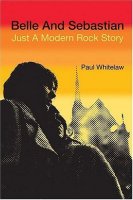Book Review: Belle and Sebastian: Just a Modern Rock Story by Paul Whitelaw
by dave heaton

The biography Belle and Sebastian: Just A Modern Rock Story sports a beautiful cover, a pixilated picture of pretty young people which in style is quite similar to the covers of Belle and Sebastian's records. That's for good reason, as the culprit is the same: the band's lead singer Stuart Murdoch designed the book cover. That fact is a small detail representative of the whole; the book was penned by Paul Whitlow, but it might as well be further titled, "as told to him by Belle and Sebastian," or "an oral history of Belle and Sebastian." The book's clear focus is on letting the band members tell their side of the story. The author's intermittent attempts to assert his own individuality – for example, through the atrocious passages where he tries to tell the band's story in a fiction-like, "literary" voice – are made utterly irrelevant in the long run. As are his opinions on the music itself. His descriptions of the songs fail to capture any of their uniqueness, and his judgments seem unsupported (and generally coincide with the band members' basic feelings about which albums and songs are the best).
What we're left with that's worthwhile, then, is the story of the band, told by the current and former band members, and a few of their friends/collaborators, themselves. And that's something major, really. For if the book sometimes feels like one more step in the band's (relatively recently-begun) publicity drive, a mark of their recent coming-to-terms with their status as public figures…it nonetheless also collects a story that has only been told in pieces before. Belle and Sebastian is marked by a real openness among the band members; their recollections come off as completely sincere. They're not afraid of contradicting each other, or criticizing decisions the band has made and routes they've taken.
As much as anything, this is the vividly told story of how a band came to be a band, and what's been involved it in remaining one. Conflicting ideas within the band – about how collaborative the songwriting process should be, about how much energy should be put into achieving mainstream success, about what they're all in the business of making music for – are central to the story, at every step of the way. According to the book, those issues are behind the departure of ex-members Stuart David and Isobel Campbell, behind various points when the group has almost disbanded, and behind the albums that were more of a struggle to make, or that didn't turn out the way the band members wanted them to. By the way, most of the albums fall into that category for the band; as portrayed here Belle and Sebastian is driven by self-criticism, on a constant, elusive quest to make an album that they, and the world, will consider truly special. While the story ends on an up note, with the band gaining the confidence to update their sound and to play live more often, the band members still sound a bit unsatisfied. In Belle and Sebastian, being a musician seems like a journey with no easy answers – a fun journey, for sure, but also often a confusing and unsteady one.
Copyright (c) 2005 erasing clouds |
|